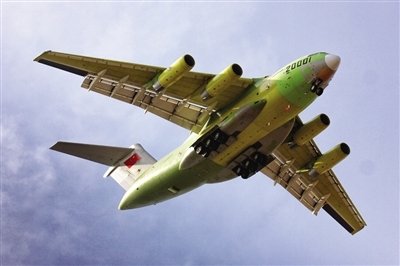
File photo of Yun-20
The Ministry of Defense confirmed on Sunday that China succeeded in conducting a land-based mid-course missile interception test within its territory. This was the second time that China has announced such a missile test, the first having been conducted on Jan 11, 2010. The test involved highly complicated technologies to detect, track and destroy a ballistic missile.
 |
|
File photo of Yun-20 |
In another development that is perceived as a milestone in the country's industrialization and the modernization of its outdated forces, China conducted a successful test flight of its first jumbo airfreighter on Saturday. Experts believe the Yun-20, or Transport-20, which could perform various long-distance air transportation tasks, will improve the capabilities of the country's air force.
China has stressed that these military advancements are purely defensive in nature, do not have a specific target and do not pose a threat to others, as the country sticks to a defensive defense policy and remains committed to the road of peaceful development.
The timely disclosure of these important moves in the military sphere bears testimony to China's increasing military transparency. This will make any accusation about China's military transparency collapse of itself.
In fact, over the past three decades, China has given top priority to economic development. After more than 30 years of fast growth, there has emerged a gap between the country's security needs and the limited capabilities of its defense forces. In recent years, the country has faced an increasingly complicated, sometimes worsening, peripheral security situation. The efforts China has made to improve its military capacity are only natural as the country strives to narrow that gap and actively respond to the new challenges in its security environment.
Last year, countries such as Japan, the Philippines and Vietnam have staged one scenario after another to challenge China's sovereignty over its islets and waters in the East and South China seas. The Philippines and Vietnam have tried to strengthen cooperation with the United States in the military field. Japan has also been counting on the support of the US, cajoling US officials to assure the country that the US-Japan security pact covers the Diaoyu Islands.
To seek confrontation with China over the Diaoyu Islands, Japan has sent warplanes to the disputed area while its rightist activists seize every opportunity to try to build up Japan's military muscle and break the limits of the country's pacifist constitution. If Japan continues to turn right, the world may not need to wait for too long before Japan tramples over its pacifist constitution.
These provocative moves have raised tensions in the waters and the region at large. It paints a gloomy picture for China's security environment, so it is right that it responds to these new challenges in a timely and effective fashion.
As the world's second-largest economy, China is justified in heightening the capabilities of its defense forces, the navy in particular, as its naval capabilities have fallen far behind the country's security needs. Amid rising tensions in the East and South China seas, the navy now faces growing calls for it to play a bigger role in defending the country's lands and waters and interests overseas.
There is no denying that a stronger China will deter possible threats, and the country will be better positioned to contribute to regional and world peace and stability.
The country's rising economic clout has prompted many in the international community to urge China to play a bigger role on the world stage. Hence, it is absurd to ask China to shoulder more international responsibilities on the one hand while criticizing its endeavors to become stronger on the other.
The author is a senior writer with China Daily. E-mail: wanghui@chinadaily.com.cn